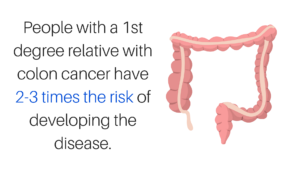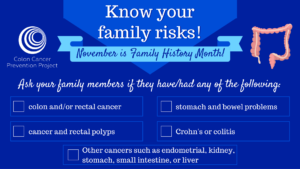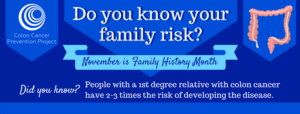November is Family History Month and so we have to ask – do you know your family history? Research has indicated that 1 in 4 colon cancer patients have some family history. If you have a 1st degree relative (parent or sibling) with colon cancer, you are 2-3 times more likely to develop the disease. If you do  have this increased risk, your doctor might recommend that you begin screening earlier. For high risk patients, the American Cancer Society recommends screening begin at 40 or 10 years before the onset of the family member’s diagnosis (whichever comes first).
have this increased risk, your doctor might recommend that you begin screening earlier. For high risk patients, the American Cancer Society recommends screening begin at 40 or 10 years before the onset of the family member’s diagnosis (whichever comes first).
Knowing your family history is especially important if your family member has or had a hereditary colon cancer. The most common types of these genetic mutations are Familial Adenomatous Polyposis (FAP) and Hereditary Nonpolyposis Colon Cancer (HNPCC), also known as Lynch Syndrome. If you have either of these hereditary conditions, your doctor will likely recommend screening even earlier.
Even if you don’t have an inherited cancer syndrome, you might still be at increased risk for colon cancer. You should talk to your family to determine whether anyone has had polyps removed, has Crohn’s or colitis, experiences other bowel problems, or has had other forms of cancer. All of this information is important when you begin talking to your doctor about cancer and your risks and, even if you’re technically too young for screening according to the guidelines, it’s never too early to start the conversation!
 As you can see, it is so important to know your family history! We hope you’ll talk to your family and then talk to your doctor. Begin the conversation about screening NOW if you haven’t already, regardless of your age.
As you can see, it is so important to know your family history! We hope you’ll talk to your family and then talk to your doctor. Begin the conversation about screening NOW if you haven’t already, regardless of your age.

You must be logged in to post a comment.